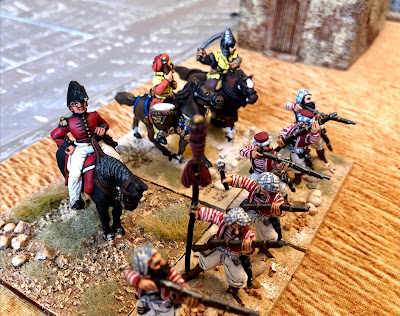This is the first of a series of historical fiction books by Jonathan Spencer set in the revolutionary wars before and during Napoleon's Egypt expedition.
Comparisons have been made with Bernard Cornwell's Sharpe series, and there is a similarity. However, our hero, Marine Lt. William John Hazzard, comes from a typical middle-class officer background, albeit not an establishment figure. He is an officer in the Bombay Marines, which reminds me of a decent series of books by Porter Hill in that setting. Long since donated to Oxfam.
The story begins during the British invasion of the Cape, which includes what Hazzard regards as a betrayal by the Admiralty. He is wounded and goes home to recover from his wounds. There is a bit of love interest that the Admiralty use to get him back into action. He recruits an unconventional unit of marines to join the fleet near Gibraltar. The French are preparing a fleet, and the Admiralty needs to find out where it is going. Hazzard and his men trek around the western Mediterranean, looking for the fleet. This includes a sojourn in Naples involving the Hamilton's and then Malta just as Napoleon and his fleet arrive.
The author keeps fairly close to the history while inserting his leading characters. The story cracks on at a good pace with plenty of action, in a style that is reminiscent of the Sharpe books. I enjoyed this and will read the next in the series. They are currently available at an excellent price for the Kindle.
The story fits well with my recent reading around the Egypt expedition, including Stuart Reid's new book of the slightly later British intervention. Unfortunately, the revolutionary wars are often overlooked in favour of the later Napoleonic campaigns, which is a pity. I am also enjoying the Napoleonic Quarterly podcast, which takes the listener through the period three months at a time. The two experts have different views of the French Revolution and Napoleon, making for some interesting discussions!
For the tabletop, I took an obscure action from Reid's book, the Battle of Belbeis. The Ottoman army was advancing on Cairo some distance from the British column. General Belliard in Cairo saw an opportunity to destroy the Turks before the British could support them. The Ottomans had around 4,500 cavalry and 5,000 Albanian infantry commanded by Tahir Pasha and Mehmet Ali Pasha. Belliard left Cairo with 4,600 infantry and 900 cavalry. After some skirmishing, he formed his troops into two large squares, a tactic the Austrians and the Russians developed when fighting the Ottomans. The usual response of the Turks was to charge the squares, but the British advisor Colonel Holloway persuaded them to use their cavalry to pin back the French skirmishers and shoot at them from a safe distance. As more Ottoman troops arrived, Belliard, running short of water and ammunition, decided to withdraw back to Cairo.
I only had room on my desert mat for one large square using my 28mm figures, but it did make for a different game. Lasalle2 rules don't allow squares to move, limiting the French tactic, although it is unclear if they changed formation to move anyway. Reid suggests that they may have done. This is tricky to replicate on the tabletop, but I will persevere.
 |
| Colonel Holloway passing on his advice! |





No comments:
Post a Comment